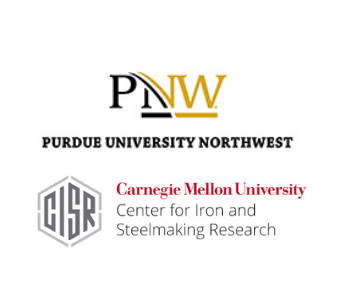CIVS Collaborates with Carnegie Mellon to Decarbonize Iron and Steel Making

PNW CIVS is a sub-recipient of a new DOE grant on a project entitled “Scaling Hydrogen-Direct Reduced Iron Pathways to Decarbonize Iron and Steelmaking.”
The project is led by the Center for Iron and Steelmaking Research (CISR) at Carnegie Mellon with industrial partners from Nucor Steel Corporation and United States Steel Corporation, with the objective of increasing the Technology Readiness Level of the hydrogen-based direct reduction of iron oxide (DRI) process. Led by Associate Director for Research Dr. Tyamo Okosun, CIVS will perform research on one of the project’s key tasks to develop and validate a Computational fluid dynamics (CFD) model of the H2 DRI process. This CFD modeling will be used in tandem with physical modeling developed by CMU to allow for a more comprehensive exploration of the parameter space to characterize and scale up DRI from pilot scale to industry scale.
In this project, Carnegie Mellon University and its partners will evaluate a hydrogen-based system for eliminating the process emissions involved in reducing iron ore into direct reduced iron (DRI)—a key feedstock in zero-carbon steel production. Extracting the oxygen from iron ore is necessary to produce steel-grade iron. To do this, carbon is typically introduced with coal or natural gas (methane), releasing carbon dioxide (CO2). These emissions can be eliminated by using hydrogen instead of carbon.
The project includes (1) building a physical pilot reactor to evaluate the performance of hydrogen DRI under industrial conditions and (2) developing a computational fluid dynamics (CFD) model to simulate hydrogen DRI processes, benchmarked to experiments. By the end of the project, an integrated set of results from experiments, simulations, and impact analysis will inform decisions regarding further development and deployment of DRI produced with more than 90% hydrogen.